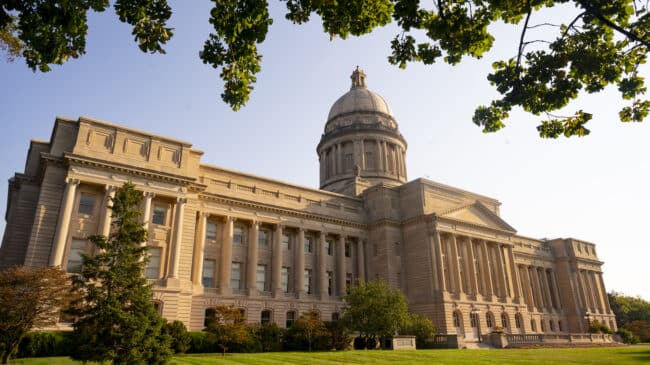In 2017, an estimated 50,000 people in Kentucky suffered from the effects of opioid abuse, exacting an economic toll of $25 billion, according to a study published in a journal of the Centers for Disease Control (CDC). Ibogaine, a naturally occurring compound, is a promising treatment for opioid dependence, and clinical trials proposed by a state commission could open access to this novel solution.
“Unfortunately, the effectiveness of current treatments for opioid use disorder is insufficient, as best demonstrated by the current crisis we find ourselves in but also as shown in rigorous scientific evaluations,” Professor Nolan Williams, director of Stanford’s Interventional Psychiatry Clinical Research, tells Reason Foundation.
Williams is the lead researcher studying the effectiveness of ibogaine in treating substance addiction. While research is limited, Williams writes, “[T]he data that we do have on ibogaine are extremely encouraging. A single dose of ibogaine has been reported to substantially decrease the desire and intention to use.”
Ibogaine is a controversial substance; early scientific research and many anecdotal reports from military veterans suggest that it is one of the only known compounds to dramatically reduce cravings for opioids permanently. However, it is also a relatively understudied and potent hallucinogen, meaning that new medical protocols will have to be combined with psychiatric support.
This is precisely why Bryan Hubbard, chair and executive director of the Kentucky Opioid Abatement Advisory Commission, has proposed allocating a small slice—$42 million out of $842 million in funds already earmarked to treat opioid addiction—toward medical research to evaluate further the effectiveness of ibogaine in treating opioid addiction. The money comes from a legal settlement with pharmaceutical companies convicted of deceptive marketing practices intended to conceal prescription opioids’ addictive potential and will likely be matched by private investors.
Today, ibogaine is a Schedule I substance under the Controlled Substances Act, and this designation creates massive barriers to research and use as a treatment. This designation reflects the Drug Enforcement Administration’s determination that ibogaine holds no medical value and has a high potential for abuse despite a growing body of evidence indicating otherwise. Schedule I substances are strictly prohibited in the United States, and it is very difficult for researchers even to conduct medical studies incorporating them.
In October testimony to the Kentucky advisory committee, Rick Doblin, founder of the Multidisciplinary Association of Psychedelic Studies, said that ibogaine could become commercially available much quicker and for less cost than typical pharmaceuticals.
The FDA has already granted a special “breakthrough therapy” designation for two other psychedelic drugs. This designation dramatically reduces the time to approval and the associated costs.
Given ibogaine’s extraordinary results similar to other psychedelic drugs, Doblin rightly argues that ibogaine could be fully approved in less than six years; it could also clear most of the FDA clinical trials for less than $100 million.
Private-sector development of ibogaine as a pharmaceutical is unlikely due to a range of government policies that inhibit market function. Pharmaceutical development is already costly because changes to the Food Drug and Cosmetics Act in the 1960s require drug makers to demonstrate not only that their products are safe but also that they meet the Food and Drug Administration’s (FDA) definition of “effective” before a product can go to market. Prior to that change, federal regulators policed safety but allowed the medical community to determine effectiveness.
In the face of these government-erected barriers to private medical research, a public-private partnership—leveraging a portion of opioid settlement funds with outside private investment—offers what may be a realistic path forward in the development of ibogaine as a potential treatment for opioid addiction in the near term.
Kentucky’s program would guarantee that at least some citizens can access this potentially life-saving medication through supervised clinical trials. The trials would be conducted at Kentucky hospitals across the state’s major regions and serve Kentuckians most in need of treatment. If Kentucky’s leadership inspired other states to also use their settlement for further clinical trials, they could fully fund the commercialization of ibogaine.
Regarding safety concerns, ibogaine can cause rare but fatal cardiac problems in high-risk populations without appropriate medical supervision. For instance, ibogaine can cause irregular heartbeats. In patients who have a heart infection because of contaminated needles, this arrhythmia can be fatal. In the early days of ibogaine research, there were a number of unfortunate deaths.
Since then, Stanford’s Williams says, advanced screening and medical oversight can now reliably prevent fatalities in clinical trials. Recent research backs this up. “The ibogaine-related fatalities occurred mostly in unsafe settings without proper medical monitoring and advanced cardiac life support capabilities,” concluded one review of research in 2021.
Without legal alternatives, veterans and other at-risk groups will seek alternative solutions in illicit markets. Frustrated by the slow pace of federal approval, voters in Colorado instead legalized personal possession of some botanical psychedelics, including ibogaine, even though there is not yet any regulated model for safe access.
“Too many veterans are stuck between two impossible options: risk dependence on or death by opioids or try to deal with chronic pain and the resulting increase in suicidal ideation,” Jesse Gould, director of Heroic Hearts, an organization that helps match veterans with addiction ibogaine treatment centers outside of America, writes to Reason Foundation in an email. “With how promising early research is around ibogaine, it is absurd that government funding is not currently supporting this research.”
Spending all of the settlement money on status-quo treatments isn’t likely to improve outcomes. Instead, Kentucky could lead the nation in exploring a promising new solution.
